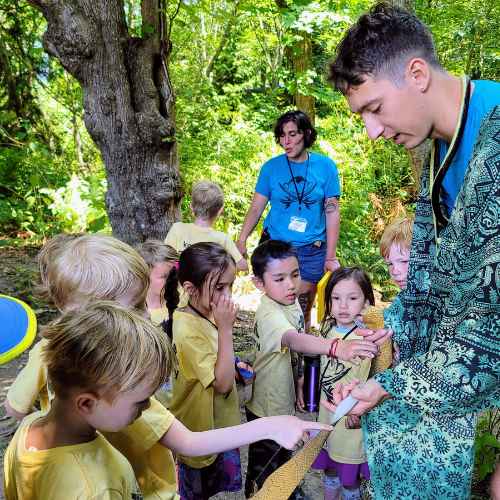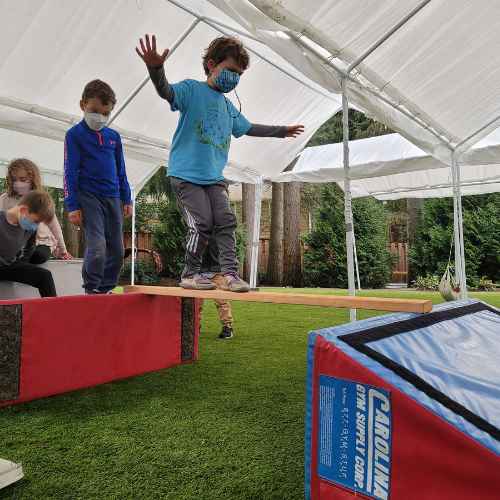
As a parent, it’s incredible to witness how your kids grow. And while they grow in so many different ways, the development of social and emotional competence is a very important part of child development. It’s the skill behind how kids learn everything from how to make friends to how to manage conflict and a million things in between.
These skills are like magical keys that unlock a world of opportunities and well-being for your child. You see, the importance of social and emotional competence isn’t just limited to childhood; it’s a lifelong gift. Nurturing these skills in your kids equips them with tools and insights they need to navigate not only the early years but also adolescence, adulthood, and beyond. So, whether you’re a new parent or have been on this journey for a while, get ready to dive into the fascinating world of social and emotional competence.
Preschool Years (Ages 4-6)
Preschool is an enchanting time when a kid’s imagination knows no bounds, and social skills take center stage. During these years, your child’s social abilities expand, cooperation becomes a daily theme, and self-expression flourishes.
Expansion of Social Skills
The preschool years are a time of remarkable growth in social skills. Your child begins to engage in more complex interactions, from playing together to sharing toys and ideas. They learn to navigate the delicate dance of cooperation and compromise, setting the stage for future friendships.
The Power of Cooperation
Cooperation is a skill that will serve them well throughout life. Whether it’s collaborating on a group project or taking turns during playtime, your child is learning the art of teamwork. Encourage group activities and games like Floor Is Lava to foster this spirit of cooperation.
Self-Expression Blooms
Preschoolers are like little artists, using words, gestures, and creativity to express themselves. And this is a time when their personalities shine brightly, and they develop a sense of self. Encourage their self-expression, whether through art, storytelling, or imaginative play.
Importance of Early Education
Preschool programs (in school or afterschool) offer structured environments that stimulate learning and social interaction. They provide opportunities for your child to learn from educators and peers, setting a strong educational foundation.
Guidance for Parents and Educators
As parents and educators, your role is to provide overall support and guidance. Foster a love for learning by reading together, exploring the outdoors, and engaging in hands-on activities. Encourage healthy communication and problem-solving skills by addressing conflicts with empathy and open dialogue.
Early School-Age (Ages 6-9)
The early school-age years mark a significant chapter in your child’s social and emotional development. During this phase, emotional resilience takes root, problem-solving skills bloom, and peer relationships become both thrilling and challenging.
Development of Emotional Resilience
This is the stage when your child learns to bounce back from disappointments and setbacks. They start to understand it’s okay to feel a range of emotions and that those feelings don’t define them. Encourage open discussions about feelings and reassure them that it’s natural to experience ups and downs.
Problem-Solving Skills Blossom
Problem-solving skills are like little seeds sprouting in your child’s mind as they encounter puzzles, conflicts, and challenges. Encourage them to think critically and explore different solutions. Be sure to celebrate their successes no matter how small!
Peer Relationships
Friendships take on a new dimension at this time, and your child may experience the joys of camaraderie as well as the occasional conflicts. These interactions are vital for building social skills and learning the dynamics of relationships.
Strategies for Parents
All caregivers play a pivotal role in nurturing a child’s emotional resilience and problem-solving skills. Listen actively when they share their feelings, validate their experiences, and offer support when they face challenges. Encourage them to communicate openly with friends and address conflicts constructively.
Pre-Adolescence (Ages 9-12)
Pre-adolescence is the bridge all kids must cross between childhood and adolescence. These years are marked by the exploration of identity, the deepening of empathy, and the gradual mastery of conflict resolution. As your child ventures further into this critical phase, they will need your wisdom and guidance more than ever.
Complexities of Identity
Pre-adolescence is a time of self-discovery and identity formation. Your child begins to explore their interests, values, and beliefs, often seeking independence and autonomy. Encourage this exploration by offering a safe space for self-expression and open dialogue.
Deepening Empathy
Empathy takes a significant leap forward during these years. Your pre-adolescent becomes more attuned to the feelings of others and develops a heightened sense of compassion. Nurture this by engaging in discussions about empathy, kindness, and understanding different perspectives.
Conflict Resolution Mastery
Conflict resolution becomes a crucial skill as peer interactions gain complexity. Your child learns to navigate disagreements, misunderstandings, and peer pressure. Provide them with strategies for healthy conflict resolution, such as active listening and finding common ground.
Impact of Technology
Technology can be both a blessing and a challenge. While it connects your child to the world, it can also limit face-to-face interactions. Encourage a balanced approach to screen time and foster offline social connections.
Insights for Guiding Pre-Adolescents
As a parent, your role is to guide and support your pre-adolescent through these transformative years. Be a trusted confidant they can turn to for advice and understanding. And also, set boundaries around technology use and encourage them to balance screen time with outdoor activities and in-person interactions.
Supporting Social & Emotional Competence
Supporting your child’s social and emotional competence is a multifaceted journey that involves various elements, from their educational environment to your role as a parent. It’s a collective effort that lays the foundation for a successful and fulfilling life.
Schools
Schools serve as crucial settings for social and emotional development. Educational institutions that prioritize social-emotional learning (SEL) provide students with valuable tools to navigate life’s challenges. SEL programs teach skills such as empathy, self-regulation, and conflict resolution. If possible, choose schools that integrate SEL into their curriculum.
Extracurricular Activities
Extracurricular activities like our afterschool programs and summer camps offer a wealth of opportunities for skill development. Activities like sports, arts, and clubs foster teamwork, communication, and emotional resilience. Encourage your child to explore their interests and passions outside of the classroom, as these experiences contribute significantly to their social and emotional growth.
Counseling
Sometimes, children may benefit from professional counseling or therapy. If your child is facing specific challenges or struggling with their emotions, seeking the guidance of a trained therapist can be immensely beneficial. Therapy provides a safe space for children to express themselves and develop coping strategies.
Parental Guidance
You play a central role in nurturing your child’s social and emotional competence. Here’s a comprehensive guide to supporting their growth at every stage:
- Preschool Years: Promote cooperation and self-awareness through age-appropriate activities. Encourage interaction with peers to develop social skills.
- Early School-Age: Nurture problem-solving and resilience. Support them in building positive peer relationships.
- Pre-Adolescence: Facilitate identity exploration and empathy. Maintain open communication and guide them through conflicts.
It’s evident that the seeds of empathy, resilience, and self-awareness are sown early, taking root in the fertile soil of parent-child relationships, educational environments, and extracurricular adventures.
As parents and caregivers, you are the architects of this development. Your role is pivotal and your presence is the nurturing sun that helps these skills flourish. It’s not just about teaching; it’s about living these values, demonstrating empathy, and fostering open communication.
This journey is ongoing. Embrace each stage, celebrate each milestone, and continue to be active participants in your child’s remarkable growth. The skills they develop today will serve as the foundation for a future filled with empathy, resilience, and meaningful connections.
At Kong Academy, we understand the importance of year-round development and fun for your child. Our After School Programs provide daily opportunities to enhance social, emotional, and physical skills through engaging activities right at their school. And for a summer filled with adventure and learning, our Summer Camps at Carkeek and Seward Parks offer a perfect setting for your child to explore, play, and grow in nature. Why wait? Give your child the gift of lifelong skills and unforgettable memories—enroll in our After School Programs today and reserve a spot in our Summer Camps for a summer of exploration and fun!
GET Access to the ULTIMATE PLAY DATE PACKAGE (Value: $49) for FREE!


7-Day Crystal Shard Adventure
Unleash your child’s potential with our 7-day crystal shard movement adventure!


